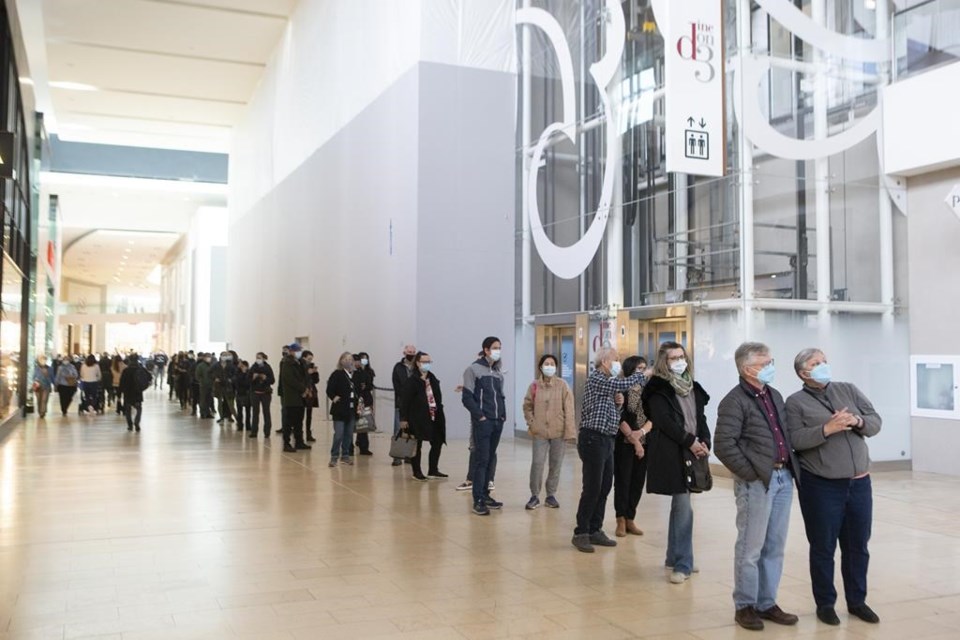TORONTO — Ontario must introduce stronger public health measures to blunt the impact of Omicron, the province's COVID-19 experts said Thursday, warning cases could soon surge to 10,000 a day in what will be "the hardest wave of the pandemic."
Dr. Adalsteinn Brown, co-chair of the province's science table, said the highly contagious variant is already dominant in Ontario and an accelerated booster campaign doesn't go far enough to keep the hospital system from becoming overwhelmed.
The province needs to implement "circuit breaker" measures that cut people's contacts in half, Brown said.
"It's not a lockdown, it's not a stay-at-home order, but it does require a reduction in contacts," he said at a news conference.
"That may be capacity limits in different settings, it may be stronger enforcement of masking indoors ... It's not new things that we haven't seen before, it's those core public health measures."
Ontario need not close schools, Brown added, but additional measures would buy time for the province to bolster its uptake of boosters, which offer far more protection against Omicron than two doses of a COVID-19 vaccine.
Premier Doug Ford has announced that all adults will be able to book a booster starting Monday, provided it's been at least three months since they received their second dose. Public health units across the province are ramping up capacity to meet Ontario's goal of administering up to 300,000 doses per day by next week.
Ford also reintroduced a 50 per cent crowd limit in venues with a capacity of more than 1,000, but declined to limit occupancy at restaurants and bars or introduce stricter limits for social gatherings.
A spokesperson for Health Minister Christine Elliott said the science table's modelling would not have factored those measures into the assumptions.
Brown said that while those limits will have some effect, it won't change the thrust of the predictions.
"They're not enough to really curb the rapid growth of the variant," he said.
Without further intervention, the science table's modelling suggests Ontario is poised to see more than 10,000 new daily cases by Christmas. Even with a circuit breaker, the science table said the daily case count could approach record levels by New Year's Day.
"This will likely be the hardest wave of the pandemic," Brown said. "But if we can control it and drive vaccination as hard as we can, we can make it to the exit."
Hospitalizations are also expected to rise rapidly now that Omicron has overtaken Delta as the dominant variant of the virus that causes COVID-19, he said.
Without additional public health measures, ICU admissions could exceed 600 by New Year's Eve. Omicron is predicted to push intensive care occupancy to "unstable levels" by early January.
The province has said about 600 ICU beds are available, with nearly 500 more available for surge capacity if needed, but experts have said surgeries will start to be affected once roughly 300 COVID-19 patients are in intensive care.
The Ontario Hospital Association said its members were planning for "a major surge" in patients with COVID-19-related critical illness. The province reported 165 people in intensive care units due to COVID-19 on Thursday — 11 more than the previous day.
Brown said he hoped to dispel assertions that the Omicron variant is less severe than Delta.
"It does cause serious disease," he said. "Hospital rates have risen in South Africa where it first took hold. It's not just a case of the sniffles."
Evidence suggests two doses of an mRNA vaccine have about 35 per cent effectiveness against Omicron 14 weeks after receiving a second dose, the science table said. With a third dose, effectiveness jumps to 75 per cent in the first month.
But even two doses of vaccine will help protect against serious illness caused by Omicron, Brown said, noting that the risk of getting severely ill was much higher in the unvaccinated.
With that in mind, he said vaccinated family members can gather at the holidays, so long as they are careful.
"If you're able to make sure that you're associating with people who are vaccinated, if you're able to increase ventilation as much as you can, if you're doing all the things like wearing a mask properly, I think it is OK to see some family at Christmas," Brown said.
Meanwhile, the province's rapid test distribution blitz began in earnest Thursday, with Ontarians lining up in droves for a shot at getting some of the free products.
Demand for vaccines also seemed to spike, as some public health units reported they had no available appointments.
"All COVID-19 vaccine appointments (including booster doses) for the 12+ population are now booked," Ottawa Public Health tweeted Wednesday. On Thursday, it said 10,000 more doses became available for walk-in appointments after the unit initially ran out of shots.
The Simcoe Muskoka District Health Unit and York Region said they were also out of available doses, while the Renfrew County and District Health Unit said its vaccine information phone line was being inundated with calls.
To help bolster the vaccination drive, Hamilton's health unit announced it would close some recreation centres and arenas to urgently redeploy about 100 workers to vaccine programs.
This report by The Canadian Press was first published Dec. 16, 2021.
Nicole Thompson, The Canadian Press

